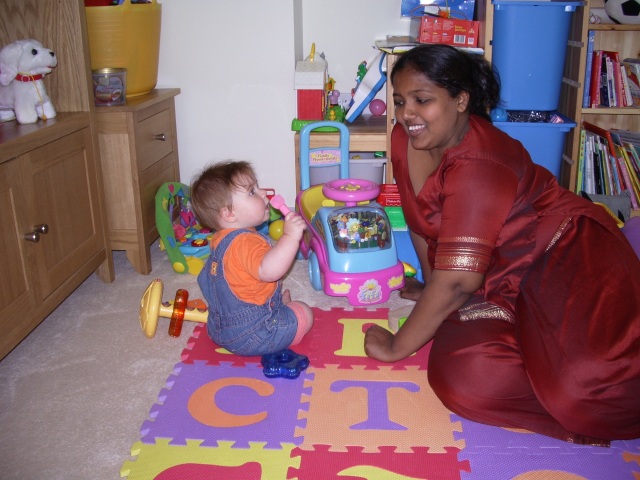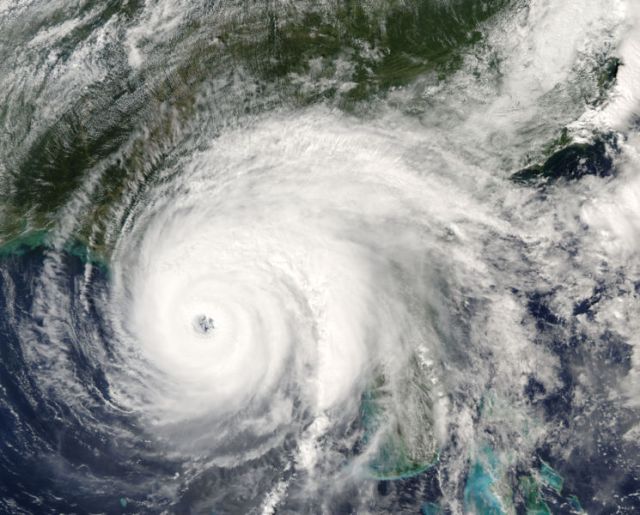———————-
Clara sent out a call for guest bloggers a little while ago. I have been meaning to write a post about the normal day to day existence we have as expats in KSA (Saudi) and it seemed to be a good fit for a guest blog. With that in mind I kept my ‘phone with me for Thursday 9 June to document my normal day.
We have been living in KSA for 2 ½ months and really starting to settle in and get into a routine. We are still, however, in the transit house (we hope to move soon), are expecting our shipment imminently and are still waiting for our pets to arrive from Malaysia so I fully expect the routine to change shortly. Indeed I hope it does as I can’t wait to get the pets here and it would be lovely for Mini EE to have her own bed in her own bedroom and not have to put up with the travel cot in ours.
Ramadan arrived last week which has also had an impact on our daily routine. The children have a later start at school, a much more civilised 08.30 compared to the awful 07.30 and shops, restaurants etc are shut until after sunset in theory and after 21/22..00 in reality.
06:30
Mr EE’s day starts a little earlier than ours, he has to be in work for 07.20, he will usually bring the children in to school with him (he is their Headmaster) but there is little point in them going in early to sit around doing nothing. Instead they can get up a little later and have breakfast at home.
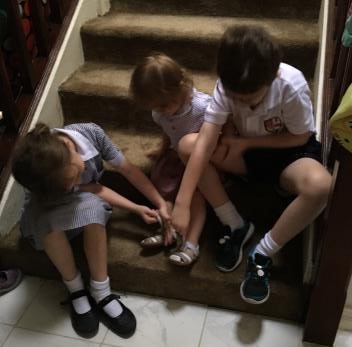
08:15 Once the older children have eaten, tidied and made their lunch boxes Master and Miss EE help Mini EE to put her shoes on and pack her bag for ‘school’ (she goes to the school Crèche every day).

The school is next to our compound and the two are connected by a door so the older two children can come and go as they wish and I don’t need to wear an abaya when I do the miniscule school run. Master and Miss EE sometimes take themselves to school in the morning but they often prefer to walk with Mini EE. They are desperate to be allowed to take her to school on their own, perhaps when she is 4 years old….

08:45 After dropping Mini EE at crèche I aim to fit in some exercise. This is an activity that is often more avoided than engaged with, but I have been pushing myself to do more. Some days I go for a swim, the compound has two pool areas and both are quiet, other days I take myself to the gym and go for a run. I prefer to run outside but the only suitable space is the school athletics track which is out of bounds during the school day (for obvious reasons). This morning I went for a swim, I have been doing about 30 lengths a time but the pool is only short so I aim to get this up to 60 and then 100 in the next few months.
09:45
After my swim and a wash and dress I tidied the house and put the laundry on. The older children are responsible for keeping their rooms tidy, Miss EE does this rather more successfully than Master EE but the rest, other than the two days we have someone in to help, is down to me. We are hoping to employ a full time maid in due course but this is a long way down the list of things we need to sort out.

10.30 After cleaning and tidying I hung up the washing and then allowed myself a 5 minute coffee break before starting work. I would love a job here in Saudi but with all the hassle of the move and all the things still to sort out I decided to wait until after the summer to search for a job and, of course, a work permit. In the interim I freelance through Upwork and get paid into our UK account. The transit house has no space for a home office so I tend to work at the dining room table, it is not really ideal but much better than perching the laptop on my knee. If we move to a larger house I will be able to get a desk, either in our bedroom or on the upstairs landing. Malls open at about 10 so I sometimes get a taxi to one of the many close to our compound if I need to pick up essentials, I won’t bother during Ramadan as daytimes are a little dull.

12:00 At around lunchtime I start preparations for the evening meal. This house has no stairgates and Mini EE has learned to climb out of her temporary play pen so prepping early gives me a chance to get everything set up and ready to go later on in the day. This means that if the older two decide to go out I am not cooking while keeping an eye on Mini EE. Today I made a tomato and mozzarella salad and put some chicken breasts in the oven to roast. I often need to pick up some extra bits and pieces (milk, eggs etc) at the compound shop and if I do I generally go about this time.

He stocks a basic range of vegetables, fruit, dairy products and snacks and is handy for top ups between big shops. I rarely eat breakfast or lunch during the week so will often pick up a biscuit or bar of chocolate when I go over. They stock my favourites, Stroopwafels, a Dutch caramel biscuit and I eat far too many of them to be healthy (you can see a pack behind my computer).

The compound is teeming with cats (I even wrote a blog post about them here). Most of them are semi feral. Some are friendly but they are all endearing. A stunning Van style cat lives near the shop and will often come over to say hello when I pop over, probably in the hope that I will drop a morsel for him.

I bake a loaf of bread fresh every day, flat Arabic bread is lovely but useless for sandwiches or toast and while there are very good French bakeries that do lovely bread, I can’t get there on a daily basis. I can get plastic sandwich loaves in the corner shop but I don’t like the taste or texture so I brought my bread machine back from a recent trip to the UK. I have been working my way through the various different recipes that came with the machine. So far the thumbs up have gone to the plain loaf, the pesto and pine nut loaf, the cinnamon raisin and the tomato focaccia. The soft rolls (which mix in the bread maker then cook in the oven and which I stuff with feta and herbs or olives) are another particular favourite.

Today I simply made a garlic pizza bread to go with supper and then put a plain loaf on to bake. In between I was able to do a little more work.

14:00 By the time I finished preparing the supper and the second batch of bread the children were due back from school. I usually walk over to get Mini EE from crèche about 14:00. By the time we have said our goodbyes to the teachers it is around 14:10 or school leaving time. We walk back past Master and Miss EE’s building, sometimes we catch them, sometimes they are waiting for us at home. The older two like to take about 30 minutes to relax, have a drink of water and play with Mini EE before getting changed and doing their prep or any extra work that I give them at home. Miss EE has reading every day and will often read her assigned books to her younger sister. I didn’t manage to get a photograph today but here is one from a few weeks ago (when, for some inexplicable reason she decided to do her reading in her bedroom).

I love baking and Miss EE enjoys helping me. Sadly the oven in our last house was an absolute disaster and made baking a near impossibility. The oven here is a little slow but is a great improvement and means that we can enjoy cake again. I usually bake a loaf cake so that the children can take slices to school in their lunch boxes but today I decided to do something different. I had seen a Betty Crocker Ramadan advert for rose and pistachio cupcakes (made using something called cake mix!) and thought that with a bit of playing around I could emulate those with a normal homemade cake batter. The experiment worked first time, the cupcakes were a great success and something I think I might add to my regular baking repertoire.

17:00 The cakes had cooled enough to be iced and sampled (with a pot of rose flavoured tea of course).
Normally Thursday nights are our heavy grocery night. Mr EE finishes work on time and we get his driver to drop us off at one of the big malls. We usually grab a burger (Hardees, an American chain, are our current favourites) during sunset prayers then we pop into the supermarket just before night time prayers and browse in relative calm (the supermarket does a ‘lock in’ during prayers). We can also pick up any clothing items the children need, browse for new books etc in the other shops in the mall. Ramadan has put this Thursday ritual on hold. As luck would have it, Mr EE and I had been invited to a goodbye party for someone from another company that he has been working closely with so we would not have been able to get groceries anyway.

18:00 The babysitter arrived. I dressed the salad, warmed the bread then cut the pieces of chicken I had roasted at lunch time before putting them into some pasta with pesto and cream to make supper for the children then quickly got ready to go out.

18:45 The party was off site (you can just see my abaya over my left arm in the picture). It was a good chance to catch up with Mr EE who had been very busy at work, he was hardly home all week and due to be working most of the weekend. It was also a good opportunity to meet some more people. I am always keen to extend our circle beyond work and our immediate compound wherever possible.

19:15 The party was not far away but Thursday nights are the start of the weekend and the roads are normally crazily busy. A week before we had gone to the same venue and the journey had taken us almost an hour. This time around the roads were almost deserted for iftar (break of fast at sundown). A few people were handing out or selling water for those who had not made it home on time. Most of our friends who are fasting say that not eating is not a problem at all but they find the not drinking very, very difficult. Our journey was so quick that we arrived early.

22:30 Tired from a long week we left the party early (Jeddah is a night life city and gatherings and parties, particularly during Ramadan, can go on until the not so early house). The event was quite close to one of the Jeddah landmark hotels which the children and Mr EE think looks like Avengers HQ. The lighting is certainly quite spectacular although my ‘phone did not do it justice.
Thank you to the Ersatz Expat for this glimpse at her daily life – that bread from your breadmaker looks so familiar from our days in Pakistan! I also love the look of those cupcakes…. Please check out the other posts in this series by clicking here, and in the meantime if you would like me to feature a day in your expat life please leave a comment below or email me [email protected].
—————————
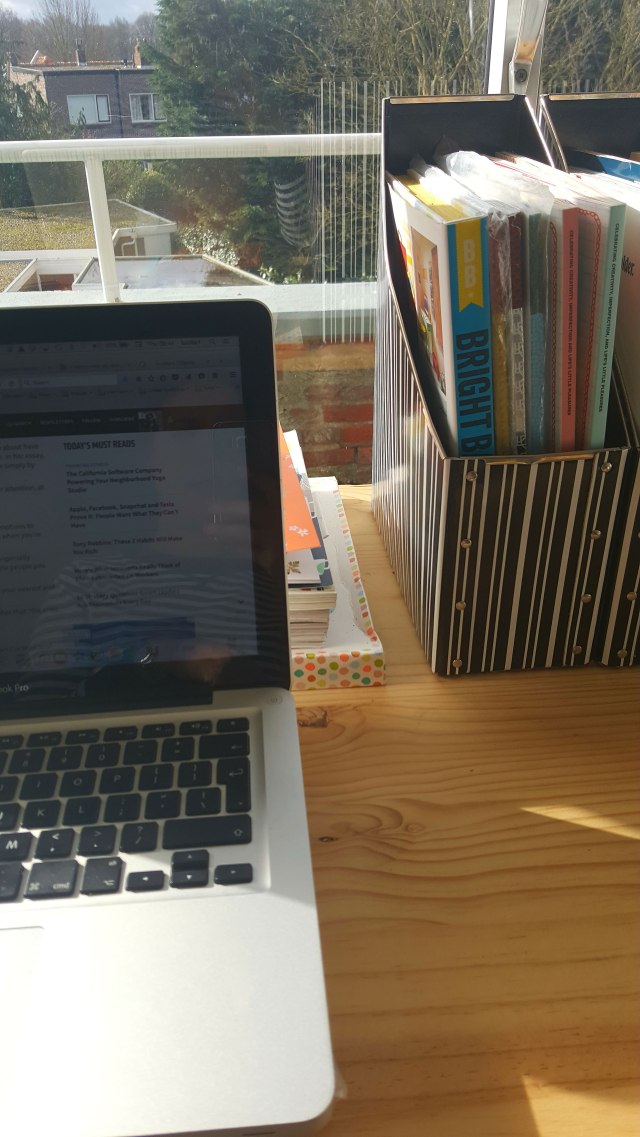
5:30am – I’m an early riser, a habit I formed when we lived in South Africa and would go running at 5:15am! In The Netherlands I still try to get up very early so I can work a bit in peace. In the summer it’s light fairly early, and by 7 the sun shines through the window on our top floor…if it decides to shine that day

7:30am – The kids wake up and come downstairs. I make them breakfast and they sit and eat at the kitchen island while I make their school lunches so we can chat. The school days are so long in The Netherlands – 8:45-3:15 – so these morning chats are an important part of our day.
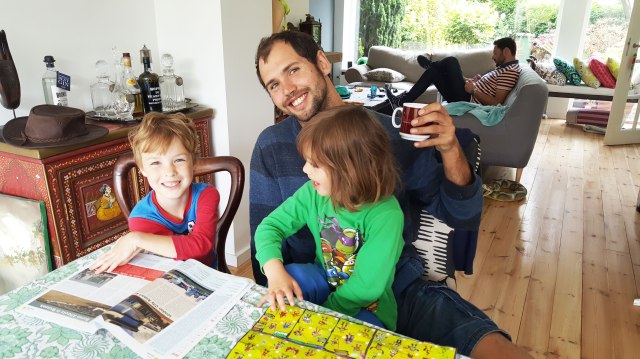
8:15am – My brother Jake is visiting from Australia, and so the kids don’t want to get ready for school, and would rather listen to his stories.
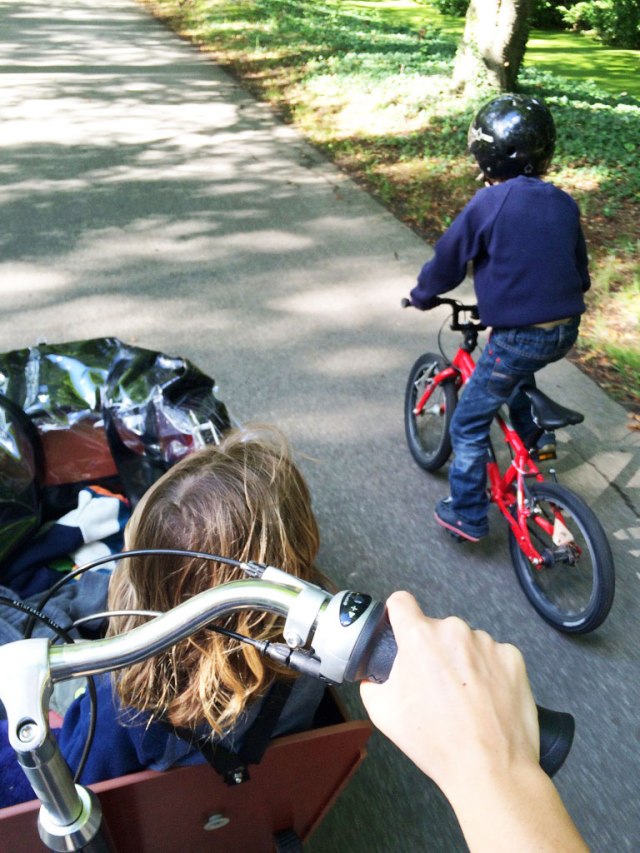
8:40am – We’re off to school, late as usual. Even when my brother is not visiting we are usually late. I am actively trying not to nag my kids in the morning, not to hustle and shout and bribe them out the door. The result is that we are nearly always 5 minutes late for school, but we are relaxed and happy so who cares! When we moved to The Netherlands I decided not to get a car, and to only cycle. My 6 year old cycles, my 4 year old goes in the Bakfiets.

9:15am – I’m off for a run. I try to go at least three times a week, even if I’m super busy. It’s important to schedule exercise into my week. There are the most beautiful trails around our house. I can run through forests, farmland or to the beach through the dunes which is my favourite run. The weather isn’t always this good!

10am – This is the beach I run to. It’s sandy and wide and on a sunny day is lovely. It’s 10kms there and back, perfect.
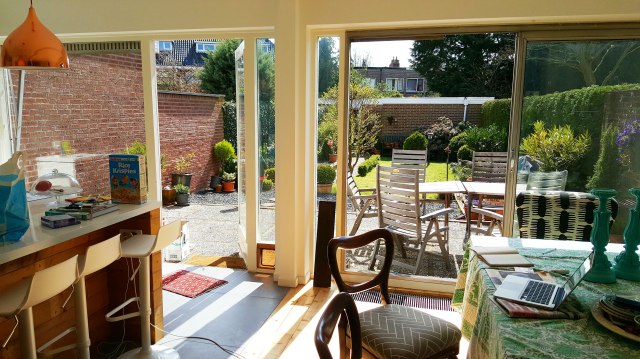
11:30 – I’m home, have showered and eaten, and it’s time to work. Work is my freelance writing, posting on my blog, or working on the copy writing business I’m starting. I don’t run everyday so usually I start work at 9 after cycling the boys to school. You’ll notice the kitchen is still a bit messy from breakfast this morning, it just has to stay that way for a few more hours! If I don’t start work now, I don’t get enough done by the time I fetch the kids.
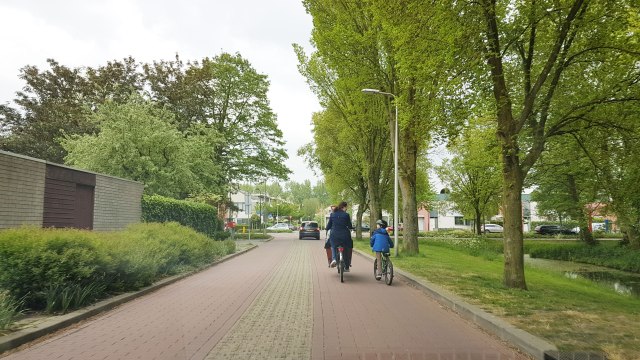
2:30 – Once a week the kids finish school at 2:30pm instead of 3:15, so off I go to fetch them. They attend the American School of the Hague and it’s in a lovely green area. The cycle is really lovely, and only five minutes from our house

2:45 – On early release days I usually pack a snack and we cycle to a forest (there are a few to choose from) and go for a walk. It’s so important to me that my kids relate to the natural world, I think I’m winning because they get so excited when they see a blackbird or magpie or some cowslip!
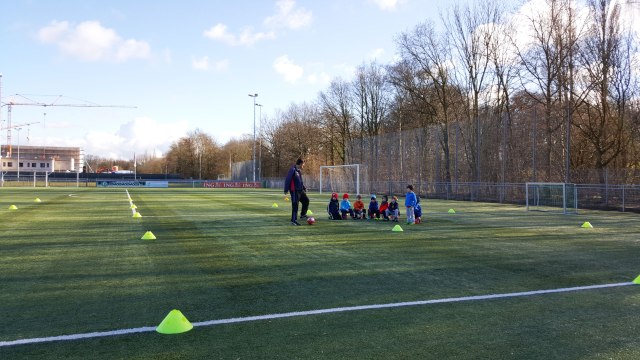
4pm – Monday is football practice. That’s the new American Consulate being built in the background.

5pm – If (and only if) I’m super organized I don’t need to go to the supermarket after football, but sometimes we stop on the way home to buy dinner. The main supermarket chain is called Albert Hein and it’s pretty fantastic with fresh produce and a wide variety. It doesn’t really compare to Woolworths in South Africa, but I don’t think anything can!

6pm – Straight home to Uncle Jake who is here from Australia to landscape our garden and who has been working hard all day! I make dinner while the boys play or watch TV. I cook separately for the kids because my husband only gets home late and we eat then. Weekends are our family meal times. That’s the reality of an hour-long commute to the office unfortunately.
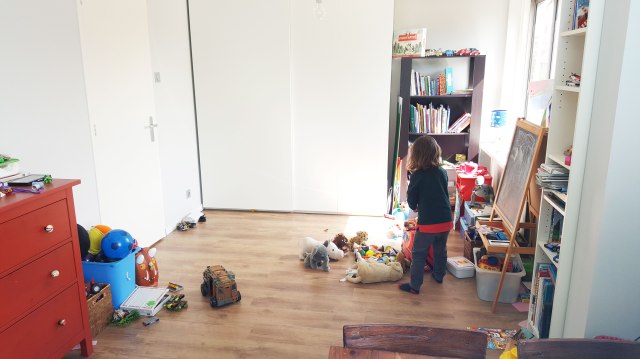
6:30pm – Playtime, bath and story. We all get into one bed and read a story. We just finished The Lion The Witch and the Wardrobe, and the boys were utterly enchanted. Now we are reading James and The Giant Peach which is such a great book. I love reading these books for the first time in almost 30 years!!
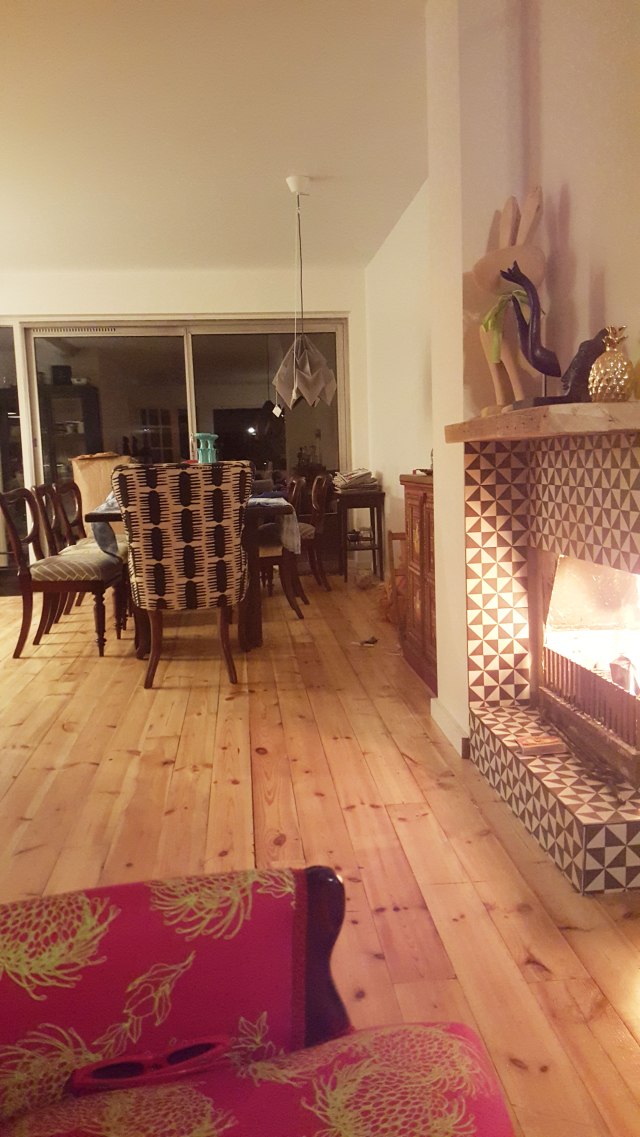
8:00pm – That’s it, days done. The boys have been asleep for a while already. I’ve cooked, my husband arrives home and we eat. If I need to finish up some work I do, but we usually watch an episode of something, maybe Outlander or Game of Thrones. I’m usually in bed by 10pm so I can get up early and do it all over again!
Thank you Lucille. The Hague was one of the places we applied for when we got this posting to Pretoria and although I love my South Africa life I can’t but help feel a little envious of this wonderful day with its cycling through greenary and runs on the beach!
Don’t forget to read the other posts in this series by clicking here.
So I was delighted when I came across the story of two women right here in South Africa, German expat Nicole and her Zimbabwean helper Charity, who have collaborated to produce a book about Charity’s life. As far as I am aware this is a unique product but do let me know if you think otherwise. But in the meantime I leave it up to Charity and Nicole to tell their story and why they have produced this amazing book together:

It´s a common situation on the African continent and in many other places around the world: A family has a domestic helper, a nanny or a gardener, often staying with them under the same roof. For many years they might be living on the same grounds, spending the day together, but how much do they really know about each other’s lives? We are not aware of the path that this person went along before ending up in our household.
First of all, how did this project come about? Who came up with the idea and what was the inspiration for it?
Charity got to read all these books in the house, because we didn´t provide her with a TV. Many different stories, lots of them stories about women. Women on all continents in all situations. So suddenly one-day Charity comes up to me and asks/says if she shouldn´t write down her story. We had a short chat about it and I really liked the idea a lot. So I encouraged her. I got her a notebook and two pencils and then obviously she sat down and started it.
How did you work together – Charity, did you tell Nicole your story? How hard (or easy!) was it working together?
Charity: I sat down in my room many nights and weekends writing down my story into a notebook, handwritten. When this was finished, Nicole provided me with a laptop and showed me how to type and save. As I was only typing with one finger, it took forever. My daughter, who is attending IT school in Harare came over in her school break for two weeks and typed the whole rest that was left for me. We sat together many, many hours. It was tough times also, because she learnt so much more in detail about her mother´s life. Many tears rolling down our cheeks during that time. Only when everything was saved in a word document, Nicole got to read my story. During the time of writing I often asked her about her opinion on certain types of writing, which we discussed then.
Nicole: Only after Charity´s whole book was digitalized, I started reading and correcting it. We often sat together, when Charity had to explain to me what she wanted to say and how certain African traditions work… I often needed to ask about types of food that are described. It was a very interesting process. We worked very hard.
Here is a story, the story of Charity, of her life, that is really touching. It´s the story of a not so ordinary Zimbabwean woman. Charity was born in 1972 and although her childhood wasn´t very easy she succeeded in getting a decent job. Unfortunately she picked a difficult husband, she lost a child and soon life was turned upside down. But still Charity could afford a maid looking after her household and her two kids while she was working. One day she made one big wrong decision. She gave up her job to go out and dig for gold. That didn´t bring her any luck and life got worse. Trying to survive with her family she ended up risking her life in the diamond fields. Also without any success. She went through extreme times in Mozambique, trapped by her own family. Many times betrayed she finally ends up in South Africa. Now working as a maid herself.
How important do you think it is for this story to be heard – not just for Charity but for all the women like her out there?
It might be a typical story of many women out there that went through similar stages or situations in life. But I still think that Charity´s life was/is very interesting to tell, because she went through so many different types of struggle, in different countries, that she managed to get through and always got out of it somehow. Always and forever having her two kids in mind and mostly wondering about their wellbeing.
What can we (as expat employers of domestic staff around the world) learn from Charity’s story? What would you like us to take away from it?
The story/book will give an expatriate an inside/background on what a woman in their household might have gone through before ending up in their house. I can only speak for Charity, but it seems to me that she just works to get a good education for her kids, that´s the most important for her. Because she knows she doesn´t have a retirement fund or similar. Her kids are her guarantee for later. If they will not be able to feed their own families and Charity, she will have a problem. She knows that she needs to finish her house in Zimbabwe and pay for their education. All she wishes for is that they will have a better, easier future/life than she had. And sure, that they will be able to look after her, when she is too old to earn her own money one day.
Charity – what would you like to see for your own future, and that of your children and grandchildren?
Charity: I want to have a better life. If I manage to finish my house I know I would have the possibility to rent out a room and earn some monthly income to get me food, even if my children wouldn´t be around, when I am older and back in my home country. Kids should have a good education and I hope that my ones can finish their courses one day and get a chance for a decent job.
I am very proud of my kids. They are always studying. Although I can only barely afford to send one of them to school at the moment, they still sit together in the afternoon at home and share their knowledge. My daughter, who is one year older, is still going to IT school and doing very well. I hope that I will be able to pay for her school fees in the future. I managed to pay for a driver licence for my son, but at the moment he is the one staying at home and studying the books for a ACCA course. Maybe I can pay for his exam fees also one day.
So a better and more stable future for the three of us, that´s what I am hoping for.
I understand Nicole is leaving soon (to go to Germany?) – will you stay in touch?
We sure will stay in touch. We have this important project going on together which is long not finished. There is still a long way to go and we will go it together. I am still looking for a publisher for the printed book for Charity.
My plan is also to translate the book in German for her. And maybe I can find a publisher for her in a Germany then.
To find out more about the book and to buy a copy please click here.
I am really pleased to be able to introduce another man in my male trailing spouse series – Stefan, who lives with his husband in Beijing, China. As well as being a man, Stefan has also had to navigate the tricky waters of expat-partnership as a member of a same-sex couple. In his case, this seems to have been relatively straightfoward (I say relatively – see below for more details) but I know for many gay couples moving abroad things are not always so simple. For this reason, I would love to hear from other same-sex expat partners (male or female) as I think this is another area of expat life that is often neglected.
In the meantime it is over to Stefan to tell us about life for him as a male trailing spouse…..

Stefan and his husband cycliing in Tiannamen Square. Stefan is on the right in the red shirt. I have no idea what is on their faces 
Thank you for being part of this series Stefan. First of all, can you tell us a little about yourself and your partner.
I am a Belgian lawyer, married to a Brazilian diplomat, and we live in Beijing, China. One could say we’re truly an ‘international couple’. We have both always loved travelling, learning languages and discovering other countries and cultures, so we consider this a great riches in our lives.
We are based in Beijing for about three years now. This is our second posting, at least if we also count my husband’s first posting in Brussels, where we first lived together.
As a male trailing spouse, how did you feel when you considered moving to your new country? How did it turn out?
Moving to a new country, especially a country geographically and culturally as distant as China, is always daunting. Especially if, like in my case, that means having to give up a job that you like. I was concerned that I wasn’t going to find another job, and I was also concerned that living in China was going to be very hard, it being so different and with the pollution etc. It turned out just fine. After insisting for a while, and fiercely defending my case, I secured a secondment to our Beijing office with my former firm, and when they insisted on me coming back, I already knew more about the local needs and job market, so i knew who to contact here to apply for a new position, based here. So with the right plan, and sufficient preparation and determination, it proved definitely possible to secure another, equally, or even more, interesting job than the one I had in Belgium. You have to be flexible though and be prepared to work in a slightly different role (and for a lower salary) than in your home country, to adapt to the local needs/ possibilities.
Have you had to give up a job/career and if so how did you feel about this?
Yes. That was my major source of insecurity and doubt. I think the same goes for most (male) trailing spouses. The lesson I learned however is not to give up too quickly. I am convinced one can find an interesting job in most places, but it may take some/ a lot of effort.

Probably one of the best pictures I have ever had on my blog…..
Have you found it easy to fit in and make friends? Have you met other men accompanying their partners or are you a rare species? If you have met others where and how have you met them?
It is relatively easy to meet other foreigners in China’s main cities (Beijing/Shanghai), as there is a large expat bubble here. Most people do not know anyone when they arrive so people are quite open to meeting new people, and it is relatively easy to make friends. There are also quite a few male “trailing spouses” here, mainly in the diplomatic community, which is nice, because you feel there are other people with similar lives. The downside of expat friends is of course that expats often leave after a certain amount of years in one place, and it can be painful to see your best friends leaving. The other side of the coin here is also that it is relatively difficult to make Chinese friends, mainly because of the language and cultural barriers.
Do you think it is harder for men than women to accompany their partners abroad – and if so, why?
Yes. Although it got a lot better over time, I feel most people are still (consciously or unconsciously) biased. Especially if the male trailing spouse doesn’t have a job in that country. People regularly depict such male trailing spouses as leading an easy, carefree (or even lazy?) life. A little anecdote in this regard is the word “guytai”, often used in china to refer to a male trailing spouse. It comes from the Chinese word “taitai” 太太, that can be translated as “respectable housewife”. Male trailing spouses are sometimes referred to as guytais, whether they have a job or not.
Have you got any particular stories or incidents to do with being a male TS? Either positive or negative.
However, especially for gay trailing spouses, getting there can be tough. A majority of countries still doesn’t recognise our marriage for instance, including China. That meant that, to the local government, we are just completely unrelated flatmates. That may create some difficulties for visa purposes. Also, the local authorities now seems to grant partner visas for gay trailing spouses as long as their union is legal in their home countries, but for some reason, that doesn’t count for couples where one of the partners is a diplomat.
Being a gay couple can also give rise to hilarious situations in China.When I talk about “my husband” to some people here, they may assume I am making a mistake and am actually talking about my wife… until they meet “her” and see “she” has a beard. The confusion can be very funny. People here generally aren’t fiercely homophobic, it seems like it is to most just something funny and unexpected to them.

What would you say to another man considering accompanying their partner overseas?
First of all, before leaving you will start doubting whether you really want to do this and whether you’re prepared to give up your job etc. you will question the reasons why you would move (including your relationship/marriage).
This can be very intense, but do know that this is all completely normal. Weigh the options, but try not to lose yourself in the petty details, break the big problem of moving down into chewable pieces (e.g. visa requirements, job applications, etc.). Know that you can most probably find a job in that other country too, but be prepared to work for it. Talk about it with your best friends and your family. Prepare several months in advance and explore the local job market, explore what kind of jobs are available to foreigners in your new home county (including visa requirements) and visit the place and try to talk to as many people there as possible about job prospects.
But my best piece of advice is: make the decision of going or not going independently and consciously, but then resolutely stop questioning that decision. A lot of unhappiness can come from keeping on questioning (“was this really a good decision? What would I be doing if I would have stayed.”) and blaming the move for everything, even after having made the move. Never victimise yourself. Know that you are leading a life that is very rich in new experiences and that is probably more interesting than the life that you would have led if you would have stayed home.
What more do you think could be done to help male expat partners?
The (unconscious) bias against male trailing spouses is probably the most annoying thing for male trailing spouses. The mentality of society should change, and I am convinced that this will happen, slowly but surely.
Luckily, unlike the ACTUAL 1950’s, we now have the Internet. So thanks to the power of technology I know I am not alone with these feelings. I put something on my Facebook page the other day about how boring the expat life of an expat wife can be and within minutes I was garnering sympathy from near and far. It’s hard to moan too much because basically we know how lucky we are. But when the highlight of your day is your husband buying you a new Swiffer mop (you know who you are!) then you know something isn’t entirely right.
While being at home far more than we’d like to be is one thing that unites us, the other is that many (most? all?) of us actually had a decent job, career even, and, you know, one of those brain things before we left our homeland behind in order to follow our dear partner abroad. Of course many of us even brought that brain along too and occasionaly get the chance to use it. But in many cases we’ve had to pack it away in an attic somewhere, with the winter coats and the thick British-winter duvets. We take it out from time to time to look at but who needs a brain when all you do all day is sit around waiting for a plumber?
I exaggerate of course (and don’t forget I do actually have a part-time job) but there is a point here. Living abroad without your normal support networks can make life pretty tricky if one of you isn’t in a position to be at home for quite a lot of the time. Not to mention someone to visit at least three different supermarkets to pick up enough groceries for one meal, queue up in five separate queues just to get your phone reconnected and still be around to ferry the children to their after school activities. I don’t know how dual-working families do it. Oh yes I do, it’s called a full-time nanny (at least here in South Africa).
I realise that I speak from a position of enormous privilege. Just the fact that I don’t HAVE to work puts me in a luckier position than most. But this doesn’t make it easier when I feel like I’ve slipped back 65 years in time, to an era where it was the norm for the female half of the partnership to spend her time “home making” while her husband took off to the exciting world of work every day. There are a number of us out there, many with professional qualifications (I’ve recently met doctors, lawyers, teachers and more – few of whom have been able to find paid work here). Some of us have chosen this route, some haven’t. For most it is something in between – this was the best solution for the family as a whole and while we may have wished for more in an ideal world, we know we are not living in an ideal world. But for all of us, to a greater or lesser extent, the frustration is real.
Added to the feeling of being tied to the house is the frustration that to all intents and purposes you are only allowed in this country because you are with someone else, and that your life is basically at the whim of that someone else’s career. As it’s common to need to go through your partner’s office for even the simplist of requests for the house or even for healthcare, it isn’t suprising that you rapidly start to lose sight of yourself as an independent person. I have already touched on feeling like a hopeless child in the early days of arrival in a new country in an earlier post. Although this does get a lot easier once you have a car, bank card and know your way around a bit, it is still easy to end up feeling like the lesser person in the partnership.
There isn’t really a solution to this, except to know that if you too are feeling like a 1950’s housewife, trapped in your home while yet another utlity person may or may not arrive at some point in the day, know that you are not alone. In fact, if it really starts to get to you why not embrace it completely? Slip on those fluffy mules, tie up your pinny….and pour yourself a nice big G&T.
NOTE: Please be assured that I don’t feel like this every day – which I am sure is true of most of my fellow “expat wives”. I am managing to get out and about and making a life for myself here. Nevertheless, thanks to the peculiarities of this life, there are still days when all my intentions to return to 2015 are still thwarted by the message that the plumber is due that day……..
Do you feel like you’re stuck in another era? Are you turning into a 1950’s housewife – or even househusband? Come share your stories and sympathise!
Photo credit: woman in kitchen – Ethan.
So I extremely grateful when an expert in this area agreed to be interviewed for this blog, and not only to discuss some of the reasons why expats are so vulnerable to depression but also to help with some advice for those who think they may be affected. Anita Colombara is a mental health specialist with a particular interest in the International Community. Her own background and experience, as well as her training, has helped her set up her on-line counselling service and to be in a great position to offer advice to the globally mobile. I hope many people will read her advice – please share this post if you can because I know, from how many people find my blog by typing in the words expat and depression, that this is a topic more people need to be aware of.
Anita, thank you for agreeing to this interview. First of all could you tell me a bit about yourself, your background.
I grew up in Washington D.C. with Asian parents. I enjoyed both the American and immigrant experience as I felt part of both and neither worlds at the same time. I also had friends who hailed from every corner of the globe. As an adult, I married an Italian/Ecuadorian who spent summers with family on two different continents. You could say that, since childhood, I’ve been embracing the world, determined to be a global nomad when I grow up.
I’ve had the privilege of visiting and living in over a dozen countries. For four years I lived in Cambodia, gave birth to my second child in Malaysia, and later, enrolled my children in public school in Beijing. Throughout these adventures, I’ve experienced both the joys and challenges of being an expat. I love acquiring new languages, assimilating to new cultures, and feasting on new cuisine. However, I have also struggled with adjustment issues – cultural shock, loneliness, and confusion; with mental health issues – post-partum depression, anxiety, and vicarious trauma; and with relational issues – misunderstandings with locals and colleagues, marital strain, and difficulties parenting my two young children. I’m guessing many of your readers can relate.
How did you come to be working in mental health and why do you think it’s important for the ex-pat community?
I started out as a social worker in the States about 20 years ago. I worked in a variety of settings focusing on issues related to domestic violence, sexual assault, human trafficking and refugee resettlement which I then implemented with my work in Cambodia.
However, during my years in Cambodia, and later in other settings, I saw that ex-pat and humanitarian worker’s needs were being severely neglected. As I mentioned, I’ve struggled living overseas. And I know I’m not alone. I’ve heard numerous accounts from those experiencing trauma, disillusionment, confusion, compassion fatigue, depression, anxiety, loneliness, etc. I’ve also seen too many marriages broken and families strained due to ignoring conflicts rather than addressing them in a healthy way. I saw the vital need for my peers, who live and work internationally, to have access to quality, professional counseling.
When I returned to the US in 2008, I enrolled in the University of Washington School of Social Work, focusing on trauma intervention and therapy.Since graduation, I’ve have been serving as a mental health therapist at a community based agency in Seattle, WA. However, my heart is still with the international community. That is why I founded Remote Access Mental Health. My vision is to see globally mobile people thrive no matter where they are. My mission is to provide on-line professional mental health counselling for this unique population.
Why remote counselling? How would the globally mobile benefit from it?
When I lived in Cambodia, there were few counselling services for ex-pats. The few professional therapists in town were often booked. Moreover, with the ex-pat community being so tight, there was a high probability that the potential client and therapist already knew one another. This made professional boundaries difficult and therapeutic relationships awkward. This is an issue in many locations, not just Cambodia.
Services offered by host or sending agencies have their own set of potential complications. A typical scenario is that of a field staff person being assigned an agency affiliated counselor when supervisors become concerned regarding mental health or other issues in that individual. Many times, since the counselor is employed by the agency, they give their assessment to the supervisor. This is not always a bad thing. However, more often than not, I’ve heard from field staff who have been hurt by their agencies when they felt that client-therapist confidentiality was violated. In some cases, this resulted in the sudden expulsion from the international arena in order to receive “treatment” for unresolved mental health issues, family conflict, moral failure, etc. Individuals and families are left feeling like they’ve failed, betrayed by their employer, further isolated, and sink deeper into disillusionment, depression, or resentment.
With that said, I know a lot of ex-pat individuals and families who would benefit from an unbiased professional who could provide support where they are. With high speed internet service becoming increasingly available, even in the most remote places, this is becoming a possibility. Although in-person counselling may be preferable, video conferencing is a viable alternative given the hectic travel schedules and lack of local services that many expats experience. Professional counselling is now within reach!
What kind of mental health services do you provide specifically for the globally mobile?
First off, I realize the term “mental health” often turns people away. They automatically assume I’m talking about crazy people with paranoia or are detached from reality. On the contrary, most of the people I work with are completely normal.
In short, I apply the same evidence-based therapeutic approaches that I use with my clients in my in-person practice. I first perform a thorough assessment to determine what the client’s needs, goals, strengths and natural resources, and desired treatment modality are. I then work together with the client to flesh out a treatment plan accordingly. I provide tools to address struggles as well as help create a plan for long term self-care.
The difference with my remote access clients is that I tailor to the unique needs of those who travel or live internationally. I am particularly interested in supporting the globally mobile population, including TCKs and ATCKs, that want to address trauma, panic attacks, anxiety, depression, and stress due to unresolved issues or culture shock and re-entry (reverse culture-shock) adjustment.
What are the signs that expats need to look out for if they think they might be suffering from depression, PTSD or other mental health issues?
Depression is different than sadness and normal life’s lows. It involves intense feelings of despair with little or no relief. It interrupts one’s life, work, relationships, eating, sleeping, and ability to engage in once enjoyable activities. Typical signs of depression are:
- Loss of interest in relationships or activities you once enjoyed
- Loss of energy, feeling tired all the time
- Sleeping more than normal or inability to sleep
- Change of appetite, overeating or lack of eating
- Difficultly concentrating or finishing tasks
- Lack of motivation
- Lack of personal hygiene
- Ruminating on negative thoughts
- Feelings of hopelessness, helplessness, emptiness, apathy, failure
- Feeling more irritable, short-tempered, angry, aggressive
- Loathing – overly critical or self and/or others
- Consuming more alcohol than normal or increased drinking alone
- Engaging in reckless or unhealthy behavior
PTSD, or Post-Traumatic Stress Disorder, is a condition following a traumatic event that leaves one with intense feelings of fear, anxiety, or loss of control. One may feel trapped in a constant state of danger or in a painful memory. Others may feel unable to “snap out of it” and feel disconnected from others and present reality.
Many of my colleagues engaged in aid and development work experience what is called vicarious or Secondary Traumatic Stress Disorder (STSD). Through repeated or long-term exposure to stories or observations of those suffering from traumatic events, one may develop symptoms similar to PTSD. These symptoms come in three main categories and can arise suddenly, gradually, or re-occur over time:
- Re-experiencing the traumatic event:
- Intrusive, upsetting memories
- Flashbacks (feeling like the event is happening again)
- Nightmares
- Feelings of intense distress
- Intense physical reactions when reminded of the event (pounding heart, rapid breathing, nausea, vomiting, muscle tension, sweating)
2. Avoidance and numbing:
- Avoiding activities, places, thoughts, or feelings that remind you of the trauma
- Inability to remember important aspects of the trauma
- Loss of interest in activities once enjoyed
- Feeling detached from others
- Feeling emotionally numb
- Lack of motivation
- Sense of a hopelessness or assuming premature death
3. Increased anxiety and emotional arousal
- Difficulty falling or staying asleep
- Irritability or angry outbursts
- Difficulty concentrating
- Hypervigilance (on constant “red alert”)
- Feeling jumpy and easily startled
Before reaching the point of needing to seek help from a counsellor like yourself, what can we do to help ourselves if we do find we are in this situation?
Self-care, self-care, self-care! I know too many good hearted people who are constantly looking out for others but neglecting to take care of themselves. Development workers, missionaries, and those on the front end of disaster relief for sure! The most important thing is to develop healthy habits and a personal Wellness Action Plan (I call these WAP for short). The second most important thing is follow through with your plan.
Your WAP should be comprehensive, including all aspects of your wellbeing – physical, emotional, recreational, relational, financial, spiritual, etc.
Your WAP should also be specific. It’s not enough to say, “I will exercise regularly.” What kind of exercise? How often? What time of the day? Where? This is especially important for the globally mobile since settings change and new locations may not accommodate to previous routines.
Lastly, your WAP should be realistic. For example, there is no point making a plan to exercise everyday if you know you’ll be on a plane two days out of the week. Make your plan attainable. Otherwise, you will find yourself giving up in frustration for not sticking to it.
Oh, and be kind to yourself. I tend to work with a lot of driven folks who are hard on themselves. Give yourself a break once in a while.
At what point would you recommend we need to seek further help from a professional such as yourself?
Negative feelings such as sadness, frustration, or stress are normal. But when they become overwhelming and interrupt daily function or lead to relational problems, it is important to seek professional help.
With that said, many people wait too long. It doesn’t hurt to seek professional help sooner than later. After all, even the healthiest among us receive physical check-ups. That is why I love assisting people in their personal WAPs to promote long-term wellbeing.
How can we support others if we start to recognize some of the symptoms of depression in them? In particular, how can we help our partners?
Often times, when a loved one is struggling, we may feel distraught or frustrated ourselves. It’s easy to go into advice giving mode or to withdraw due to feeling at a loss regarding how to help. However, the most important thing is your presence – being with them even if it just means holding them, crying with them, or sitting beside them in silence. Validate feelings instead of try to reason with them. Watch out for minimizing their pain, blaming and shaming. Educate yourself on the disorder so that you can better understand your partner, but be careful not to lecture them.
If your partner is reluctant to seek professional help, that does not mean you cannot seek help for yourself. A good therapist will be able to guide you through the process of assisting a loved one struggling with mental health.
Do you have any particular advice for children who might be showing signs of depression? How would this manifest in them differently than in adults?
The answer to this important question deserves an article itself. In short, children often act out what they cannot put into words. Often times, symptoms of depression, anxiety or PTSD in children are misdiagnosed as ADHD. Children often manifest troubling behavior such as difficulty focusing, defiance, difficultly regulating their emotions, hyperactivity, inability to calm down when aroused, lack of boundaries or risky behavior. They may engage in violent or self-harming behavior such as cutting themselves or hitting their head against a wall. Other children, may retreat, fall silent, even becoming mute. This is often the case for someone with PTSD. Again, disturbing behavior is a sign of a more significant, underlying issue that needs to be addressed.
Anita Colombara MSW, LSWAIC
Anita is a licensed Mental Health Professional by the State of Washington. After spending many years in Asia, she currently resides in Seattle, WA where she lives with her husband and two children and enjoys the natural beauty of the Pacific Northwest. She is the founder of Remote Access Mental Health LCC, providing on-line counseling for the globally mobile. www.remoteaccessmentalhealth.com
If you are or think you may be suffering from depression, or are vulnerable to depression, then please do talk to someone close to you and/or consider seeking help. As well as counsellors like Anita, charities like MIND can also offer online support and advice. I list other forms of support in my book the Expat Partner’s Survival Guide.
Photo credits: woman with key: Mary Lock at https://www.flickr.com/photos/wijen/; woman at table: Adi Sujiwo at https://www.flickr.com/photos/wijen/
When I left my home in San Francisco last January, I’d already spent fifteen years building a nonprofit fundraising career, a deep bench of friends and neighbors, and an all-around gorgeous, jasmine-scented life for myself in the fresh-produce-capital-of-the-world. Water restrictions aside, living in California was pretty easy, and my life seemed well defined into the distant future. And then, as happens in the best stories, love walked in.
It was a surprise, and it wasn’t. My husband and I actually met on the first day of classes, freshman year of college. We reconnected later in life thanks to the wondrous glory of FaceBook, and married a mere 17 years after we first shared an early-morning class back in the mid-90s.
By the time we reconnected, he’d built a career with the government overseas, but ultimately gave me the call on where and how we would live. He offered to leave it all behind if I wanted to stay in San Francisco, where he’d join me and create a life for himself, or I could give up my digs and follow him abroad. It wasn’t much of a choice, to be honest. A life full of adventure and travel in far-flung places full of mystery and intrigue? Uhh… Where do I sign?
After years working in less-than-plum locales, he was finally due a reprieve
I am still pinching myself.
This city is effing magical. It’s castles and cobblestone sidewalks and kannelbullar (Swedish cinnamon buns) kind of magical. It smells good here. Nearly every day I am ambushed by unexpected beauty; some assault on the senses that leaves me gobsmacked by my good fortune. You should see the city parks here. It’s so green, and gorgeous, and European in the most beautiful way. I have never felt so lucky.
Now, I know, I know…this is all fleeting. Not only will we have to leave here in a few years, but reliable sources suggest I should temper my expectations for six months from now when there are four hours of sunlight on a good day. And I know that the shine of a new city (if it shines at all to begin with) loses some luster after time passes and daily irritants take their toll. Don’t even get me started on how hard it is to get internet in our home. I’m writing this post from a ferry in a Swedish archipelago outside Stockholm, where it’s easier to access wireless internet than it is in the middle of the city, where to have internet in our apartment, we first need a personnummer (the Swedish version of a U.S. Social Security number, which is required for everything, and to procure takes approximately 3-6 weeks). Then we must open a Swedish bank account, because no business here accepts online payment without a EU-based credit card, and then finally we might be trusted with internet in our apartment. It is 2015, for goodness sake. Why is this not a basic utility!? (Amirite? Anybody else struggle with this one?)
But minor frustrations aside, the last few weeks have been tremendously happy ones. I know how lucky I am, and I am determined to enjoy every minute, and live in the now. I have a terrible habit of leaning forward to a point in time, and often waste precious moments thinking/worrying about something that may never be real. Until the U.S. government sends us on to our next assignment, I intend to suck the marrow out of this good Swedish life I’ve been given, herring bones and all.
Thank you Jessica – I hope you continue to enjoy beautiful Stockholm and the whole of Sweden (it does sound amazing – being a big fan of cinnamon buns I might just come visit…)
Anyway, as she made her way through the book, she reached the chapter about employing domestic staff. And she asked me a question. Earlier in the book she had read about how to find ways to occupy yourself. Then she came across the chapter about employing staff to do your cleaning, ironing, gardening etc – all those things that we get people to do for us when we move to certain parts of the world. And she, quite reasonably, asked why not do the work yourself – wouldn’t that at least partly solve the problem of trying to find ways to occupy your time?
It’s a good question and one I do tackle in the chapter my friend was reading on Domestic Staff: Finding Them, Keeping Them and Treating Them Like Human Beings (perhaps she just hadn’t read far enough into the chapter). From the outside looking in, as my friend was, this is one of the aspects of Expat Life that is hard to understand. I did explain to her that not every expat has domestic staff – if you are in Europe or the States, you’re probably looking at a cleaner a couple of hours a week if you’re lucky.
But many of us do, and it is one of those difficult topics that’s hard to discuss with people who haven’t lived in certain countries in the world. I know a lot of us don’t particularly enjoy having staff to do all the crappy jobs in our house that we could do ourselves…if we really had to….but we don’t, because we can afford to pay someone else to do it, and because it’s so damn hot, and the house is so damn big….
But how does it make you feel to be sitting on your sofa reading a book, or lying by the pool, while someone else is down on their knees scrubbing your floor? It feels pretty bloody awful doesn’t it?
So how do you deal with it?
Well, the advice I give in my book is first and foremost to treat your staff with respect. And treat the work they are doing with respect as well. It may feel like crappy work you don’t want to do, but it’s an honest job that helps people earn an honest wage. A wage which will almost certainly be supporting a family, possibly even an extended family. It may be paying for their children’s education (in Pakistan, our helper Ansa’s wages were paying for her daughter’s schooling), or for your staff to make a better life for themselves (in Jamaica, it ensured my helper Anne-Marie was able to move away from the dangerous inner-city and allow her and her daughter to live in relative safety). It would almost certainly be difficult, if not devastating, for that member of staff to have their job taken away from them – just because it made you feel awkward.
Yes, it’s hard – I hate being in the house when anyone is cleaning it, whether in this country (the UK) or abroad. I usually find a reason to be out of the house, but that’s easier when it’s two hours a week than when it’s two days a week. Or longer – in some places it’s quite common still to have live-in maids. But it’s MY awkwardness, not theirs. And my problem, not theirs. And I shouldn’t make them know that I feel awkward because that would mean that they would know that I thought there was something wrong with what they are doing….
…it’s a tangled web, isn’t it?
There are things you can do to make things easier between you. Sit down to lunch with your staff, make it for them or serve it to them. Find other “chores” to do while they are cleaning, like cooking or tidying the bedroom. Lock yourself away in a study with your laptop and furiously beat away at your keyboard, very loudly, so they know you are working too. Help them (but don’t get in their way. They know what they are doing and are probably a lot better at doing it than you are). Just talk to them, ask them questions, use them to find out more about the place you live, their views on local politics, where to shop etc – it’s amazing what you will learn.
These are all my tips, but I would love to hear from you. If you live somewhere with staff working in your house, do you find it difficult? If so, how does it make you feel? Or if you’ve never been in this situation, how do you think it would make you feel? Or if you yourself have been a staff member, cleaned someone’s house or gardened – did you ever think about this at all?
In the meantime, I’ve got to go. My cleaner will be here soon and I really need to be out of the house……
The title of this post might be what to do when a hurricane hits, but really you should start your preparation long in advance of the moment the storm reaches you. There’s no excuses not to be prepared these days – if you move to a part of the world where hurricanes, typhoons, cyclones or other large storms are a common occurrence, you’ll know it. You should be prepared from day one. Additionally, modern weather prediction means you will usually know at least a few days in advance if you are likely to be in the direct path of the storm– and whether it’s picking up or losing power as it approaches. So what can you do to make sure you are ready – and then survive the storm if it does hit?
From the moment you arrive
If you are moving to a country where extreme weather events are a common occurrence (the Caribbean, parts of Southern USA, the Philippines, Japan all being good examples), then make sure you have everything you need for the day that inevitable storm arrives. Basics include torches and batteries, baby-wipes, essential medicines, nappies or formula if you have a baby. Keep a supply of non-perishable food and bottles of water year round, separate and away from your usual store cupboard (so you won’t be tempted to raid it and then forget to re-stock!). If you can, add a small camp stove or similar – something that can at least boil some water and heat up a tin of beans. Not only are you likely to be confined to the house for the duration of the storm, you may also be without electricity for a few days. A good first aid kit is important. Hopefully you won’t need it, but there can be a lot of flying debris during a hurricane so it’s better to be able to treat any minor cuts and bruises yourselves rather than attempt to get to a doctor or hospital.
You should also check to make sure your health insurance covers you for weather events like a hurricane and if not whether you need to take out extra insurance.
In the run up to “hurricane season”
Closer to the dates when storms are most likely to occur, make sure you know any local evacuation routes. If you need to, do you have a way to keep in contact with others in your family? Phone lines and mobile coverage might be effected. What about schools – what are their plans during an evacuation situation? How will they contact you if they need to? Check over your food and water store and re-stock if necessary.
If a hurricane is on its way
You should have good notice if a hurricane is heading towards you – most of these storms start out of sea and only become a threat once they start to reach land. The Weather Channel, the National Hurricane Centre and other sources are all good predictors of what is heading where and how hard it will hit.
As soon as it looks like one might be coming your way, fill your car up with petrol in case you need to evacuate, check the car over and if possible put it somewhere safe and under cover. If you need to, stock up with extra food and water. You may want to board up your windows – if you haven’t already done so, now is the time to buy the boards (before they sell out) and work out how to get them up.
Within 24 hours of the storm’s predicted arrival, put up your boards and move any outdoors furniture you have into your house. Move as much of your furniture as possible into the centre of every room. If flooding is likely, also move as much as you can off the floors. Collect together any important paperwork (passports, insurance papers etc) and put them into something waterproof. If you think evacuation is a possibility, pack a bag for everyone in your family (don’t forget pets!), including all the important paperwork. Looting is always a possibility in homes abandoned in an emergency so try and think what you might want to take with you – although bear in mind where you will be going. Keep listening to all broadcasts on the radio and television. Decide which part of the house is the safest – this should be somewhere with the fewest windows so if you have an interior room like a bathroom you might want to think about setting up home in there in case things get really hairy. Stock it up with pillows, books, games – it may be a long night. Fill your bathtub(s) and sink with water.
When the hurricane hits
Don’t go outside, stay away from windows and in no circumstance try and fix fallen cables or similar. If necessary, turn off your power supply (if it hasn’t already been switched off by the authorities). You might feel safer in the windowless room – even if it’s just for a few hours. If you do still have electricity, keep listening to all broadcasts. If you are told to evacuate, follow instructions. There may be a lull as the “eye” of the hurricane passes over; this might not last long so be careful if you do go outside and don’t venture far.
After the hurricane
Once you are sure the storm has passed and it’s safe to go out, check around your property for damage and if necessary call in on any neighbours who might need extra assistance to make sure they are okay. Once power is restored, listen to news for roads that have been blocked or airports closed. It may take a few days for things to return to normality and of course for some people it never will. Hurricanes can be difficult for expats but devastating for locals who live in far less secure and solid housing. This is the time to give back to your host nation – check whether any of your local staff need assistance, or help with fund-raising efforts.
Have you lived through a hurricane, typhoon or other major weather event? Do you have any tips to add to these? Or would you like to tell your story on this blog? If so please get in touch: leave me a message or email me [email protected].
This blog post was first published on the Medibroker website https://www.medibroker.com/blog/.
The first came from a relatively new expat, thesmult, an Australian living with her husband in Indonesia. Having arrived recently, thesmult has been struggling with her new identity and how to find her way in this unknown world. And by unknown I don’t mean Indonesia, rather the life of being the “trailing” partner. As she says in her post Who Am I Now?:
We had discussed the challenges faced when residing in another country and particularly a developing country such as Indonesia including language barriers, expectations of women in a Muslim country, security concerns and so on but we never discussed how life would change so significantly for me as the stay at home spouse.
It is for people such as thesmult that I initially wrote the Expat Partner’s Survival Guide. Living in St Lucia, I met a lot of women (and a very few men) in exactly the same place as thesmult. Women who had probably spent the six months prior to the posting worrying about houses and schools and packing and saying goodbye to people…but who had never really thought about what their life would be like for THEM when the dust settled at the other end. As thesmult also says in her post, the first few weeks (the “honeymoon” period) can certainly be exhilirating. But then reality hits and
you realise that this is real life and then I started dwelling on my frustrations. I was bored, lacked structure to my day, had no social outlets, felt stuck at home.
I urge you to visit thesmult’s website, follow her and comment. I feel really strongly that the more you realise others are going through the same thing, or have been through the same thing, the easier it can be. Virtual friends made over the internet through blogging or Facebook forums might not be quite as good as the real thing – but they can certainly make a huge difference.
The second post I read this morning that made me really stop and think was from a seasoned expat who blogs at the fantastically named Africa Expat Wives Club. Based in Kenya, this expat wife is at the other end of the expat partner scale from thesmult as she’s been overseas for 16 years. And yet, she still gets lonely – as her post Loneliness in Expat Life Sundays Suck – relays.
Again, I can totally relate to her when she says:
Sundays are the real bone of contention. Sundays can drag and if your other half is away on business, then you can literally find yourself counting down the hours. As an expat, you are obviously nowhere near your home turf, so there’s no family member who might step forth from the breech and provide a safe haven for you and your bickering, antsy offspring for 12 or 24 hours. There are no close friends from way back to pick up the phone and chat to. It’s just you and the kids bouncing off the walls for 12 hours straight and honestly, that can be hell. Sundays are when you feel most trapped.
Oh yes. Sunday’s (and to be honest, some Saturdays) were difficult in St Lucia. Everyone assumed we would be at the beach every weekend – and to be fair we often were, or at least at the pool of one of the local hotels. But doing the same thing EVERY weekend can get pretty tedious and there really wasn’t much else to do on that small island. We absolutely revelled in the parks and soft-play and museums and organised activities when we returned to the UK.
The Africa Expat Wives Club post also refers to the dreaded 9 (plus) week summer holiday – something which I know my own poor mother must have found impossible when we were growing up in the Philippines, and which I have now learnt to avoid by leaving the country where you are posted for as much of those 9 (plus) weeks as possible. I have also realised that one thing you DON’T do is move out to a new country at the start of, or even in the middle of, the summer. Things are made even worse when the children haven’t yet had the chance to make friends through school (or pre-school) and all their toys are still somewhere on the high seas….
So two very honest but I think realistic views of Expat life. Like some of my other posts about the reality of being an expat partner (including this one on depression and this one on relationships) I think these are important subjects that need to be shared.
However I do feel I have been writing too much about the bad side of expat life recently. I promise my next post will be a positive one 








